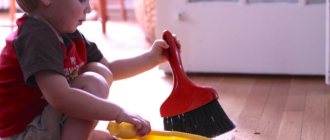Diseases
If your child has a strong immune system from birth, then it may fail for many children who, from the first days of attending kindergarten, are faced with various viral and infectious diseases.
In the first year of attending kindergarten, children often suffer from ARVI, flu and sore throat. Pediatricians, reassuring parents, assure that if a child gets sick up to 10-12 times a year, then this is quite normal. However, most mothers work, and if grandmothers are not around, then they have to take sick leave; this state of affairs does not suit all employers.
In addition to the “usual” illnesses, parents need to be prepared for the fact that their child may get chickenpox and will have to hand over tickets and cancel their vacation trip.
Chickenpox in kindergarten. Photo check-robot
It is no better than rotavirus and intestinal infections, to which children attending kindergartens are susceptible.
And with what horror mothers react when they discover lice on their child. Children from different families attend the group, so it is possible that being next to a lousy child, yours will not bring them into the house.
The new severe viral disease coronavirus does not spare children either. There are many cases where children become infected from their own teachers. And in the best case, all other family members will not become infected from the child.
Moral manner of speaking
The intonation and manner of speaking of teachers who enjoy authority among children leads to the fact that children begin to copy it in conversation with everyone. A moralizing tone becomes the norm of their conversation. Parents need to try very hard to become an indisputable authority for their child, someone they would like to emulate.
Snitch in kindergarten. Photo Yandex.Pictures
Snitching
Usually, teachers encourage and transfer to the category of favorites those children who snitch on the rest of the students in the group. Unfortunately, by setting the example of children who “snitch” on their own friends, educators thereby form in the child an incorrect attitude towards peers. Children need to be taught to observe themselves, to monitor their good manners, and not to report to the teacher about someone else’s mistake.
The nervous system and its role in child development
The baby’s nervous system regulates the vital functions of the small organism, ensuring the coordinated functioning of the whole organism. Its main function is the integration and regulation of various processes in connection with changes in the internal and environmental conditions of the baby. The improvement of the nervous system is gradual. In pediatrics, there are different periods. Each of these periods is characterized by its own characteristics. There are certain criteria for the formation of a baby in each period, which make it possible to distinguish between normal and pathological conditions.
Obscene words
Adults should not hope that their child, without hearing curses or obscene expressions at home, will remain completely unaware of them. Everything new and unusual attracts the child’s attention, so they immediately remember curse words. Many people don’t know how to deal with this: let it take its course, wait until he gets tired of expressing himself like that, or stop it and even punish him for it? Unfortunately, there is no universal recipe for this.
Adaptation to kindergarten. Photo kidpassage.com
Intimidation and horror stories
Pupils of middle and senior kindergarten groups often amuse themselves during walks by telling each other terrible and scary stories. This happens when educators do not ensure that children play active or interesting mass games. They stick to their mobile phones and surf the Internet, and the children are left to their own devices.
As a result of such stories, children are afraid to be alone at home, and even to enter the room if the lights are off.
Bad behavior
Children happily adopt bad manners: they think it is very funny and worthy of encouragement. Parents are perplexed when they see for the first time how their baby enthusiastically picks his nose, wipes his dirty hands on his clothes, or, without using a handkerchief, smears snot all over his face. It’s even worse when, in response to any disagreement with an opinion, he begins to spit on the person.
It is useless to beat and constantly scold a child. Try, without losing your temper, to clearly explain to your child that from the outside he looks very ugly using such behavior.
The child has bad manners. Photos






